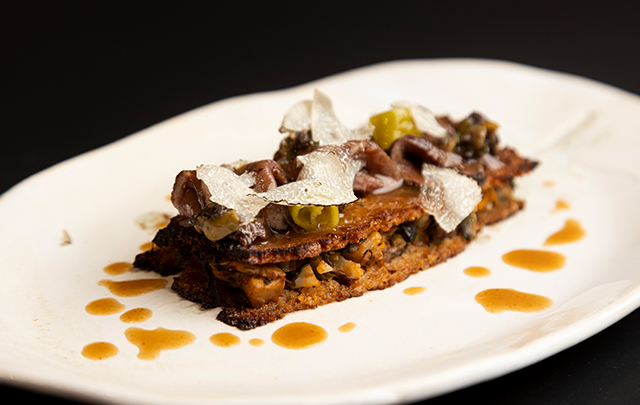News
"What would a chef with eight Mallorcan surnames do in Mallorca?”

With "soul and knowledge", Santi Taura reveals the secret of how he creates 8,000 tasting menus at Dins
Santi Taura has been at his restaurant Dins in Palma de Mallorca for eight years, not only as a chef, but also as a kind of "storyteller" who tells the story of each dish. When the guest sits at the bar, they hear it from his lips. This is the story that he told at Madrid Fusión Alimentos de España, explaining how his restaurant in Palma de Mallorca manages to stay open all year round and serve around 8,000 tasting menus to a clientele that is 60% local, and the rest, tourists.
"I cook with a lot of soul, a lot of feeling. We don't hide anything. We haven't invented anything new, we don't think we're the best restaurant in Mallorca, we're not the best chefs. But we have a different concept. Nobody cooks history better than us. We make traditional Mallorcan cuisine".
"I had to create something that Mallorcans could be proud of, and that visitors could taste. The authentic recipe book. The concept was simple: Mallorcan cuisine, and what was a chef with eight Mallorcan surnames going to do in Mallorca?”
Taura continues: "Since no one told us where these recipes and products came from, I started researching. We already had a clear concept and target group. I needed the space”.
"Dins' means 'inside'. We wanted to show what is inside the Balearic Islands, with what I have inside: passion, knowledge, and soul. I am part of the concept. I am the key piece. We don't give away our recipe book. The ingredients are the same as in the original recipe. When you eat at the bar, in the kitchen, I tell the stories personally".
With around 8,000 tasting menus, the staff working 40 hours a week, and everything being "legal", Taura teaches three recipes from his menu. One is based on an "old" and traditional type of carrot, used only in private households, cooked with a pork sausage base. The second is based on cuttlefish, with a sofrito made from its roe and guts, and the third is a Mallorcan soup. "It is not a recipe, but a way of cooking. It was a very poor island where there was a lot of hunger before tourism arrived. There are hundreds of recipes for soups. Some water and a few slices of stale brown bread were added to fatten up the recipe, which was often the only thing people ate during the whole day. This is Mallorcan hunter's soup, with a pigeon. It is forest cuisine".
Taura continues: "Every week they would change one or two things, depending on what was in season. People cooked with what they had around them. In the past, people cooked like this and didn't go looking for other products. We change the presentation. Often you have to bring it up to date. If I present it the way my mother would, a lot of people would not eat it. I add value to it.
"But the concept is sustainable if the restaurant is profitable. We are open all year round. Our clientele is 60% local and 40% international. That's why we can stay open all year round. Others have to close for three or four months. There is no other way but to focus on the local public. They have to appreciate it. If we didn't cook that feeling, we wouldn't have that local audience".
He concludes: "Somebody getting emotional and crying at the table has happened to me quite a few times. That's because you're touching people's hearts and memories".











































































